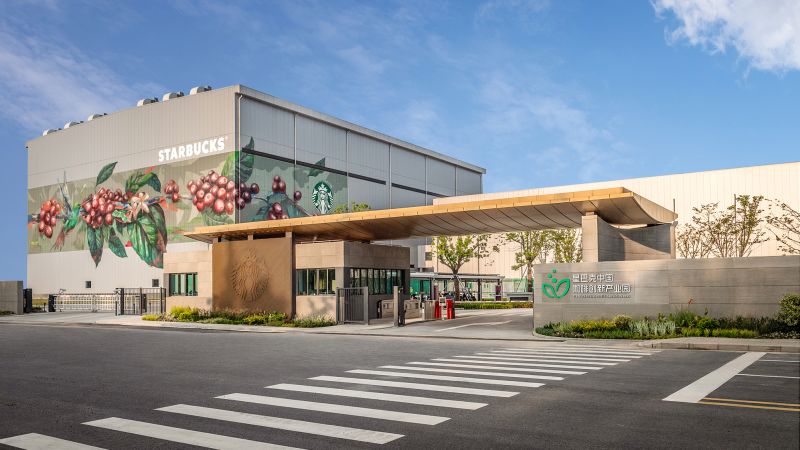Editor’s Note: Sign up for CNN’s Meanwhile in China newsletter which explores what you need to know about the country’s rise and how it impacts the world.
Starbucks says it has poured more than $200 million into a new campus in China, in a sign of how the Chinese consumer remains crucial to the global coffee chain despite a major economic slowdown.
The beverage giant opened the massive facility in eastern China on Tuesday that will serve as its main production and distribution center nationwide, supplying fresh coffee to thousands of Chinese stores, it said in a statement. The site is home to a large coffee roasting facility and an area that lets visitors see how drinks are made.
Starbucks (SBUX) says it has committed a whopping 1.5 billion yuan or about $220 million to the project, the largest investment it has ever made for a coffee manufacturing and distribution center outside the United States.
That’s nearly 50% more than the $150 million it had previously allocated in 2020, which was already higher than the $130 million announced earlier that year.
Asked why the amount was raised twice, a company spokesperson told CNN that “additional capital investments were made to further elevate the advanced technologies and equipment used.”
The opening of the 80,000 square-foot (7,400 square-meter) “innovation park,” located in the city of Kunshan, about an hour from Shanghai, comes after a year-long delay.
Starbucks had previously said the facility would be “operational in summer 2022,” though the timeline was given in November 2020, as China grappled with disruptive pandemic-related restrictions. The company did not immediately respond to a request for comment Tuesday on reasons for the delay.
China has long been one of the most important growth drivers for Starbucks, serving as its second-biggest market worldwide and top overseas market.
But CEO Laxman Narasimhan says the company is “still in our early days in China,” noting that coffee consumption in the historically tea-drinking nation remains relatively low.
On an earnings call last month, he pointed to how revenue in China had rebounded earlier this year after the company’s sales in the country were dented by Covid-19 restrictions, which were lifted late last year.
China’s economic growth is set to slow this year as it continues to reel from the effects of a crisis-hit property sector and choppy consumer confidence. But new data on Friday suggested the downturn was stabilizing.
“As one of the largest consumer markets in the world, China presents tremendous opportunities for Starbucks,” Narasimhan said in the statement.
He said the new space would improve its supply chain and sustainability goals, particularly as the facility is set to become the company’s most energy-efficient coffee manufacturing plant in the world.
“I couldn’t be prouder of the China team’s visionary thinking,” Narasimhan added. “As Starbucks’ largest and fastest-growing international market, we will continue to deepen our investment and reinforce our unwavering long-term commitment to the China market.”
Read the full article here










